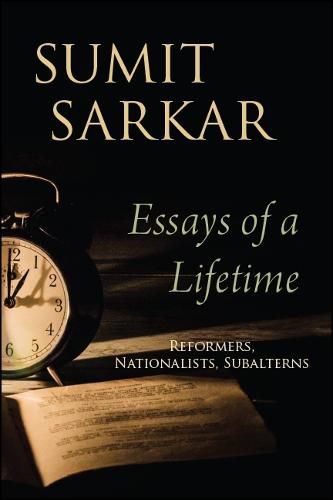Readings Newsletter
Become a Readings Member to make your shopping experience even easier.
Sign in or sign up for free!
You’re not far away from qualifying for FREE standard shipping within Australia
You’ve qualified for FREE standard shipping within Australia
The cart is loading…






For the past forty years or more, the most influential, respected, and popular scholar of modern Indian history has been Sumit Sarkar. When his first monograph, The Swadeshi Movement in Bengal 1903-1908, appeared in 1973 it soon became obvious that the book represented a paradigm shift within its genre. As Dipesh Chakrabarty put it when the work was republished in 2010: Very few monographs, if any, have ever rivalled the meticulous research and the thick description that characterized this book, or the lucidity of its exposition and the persuasive power of its overall argument.
Ten years later, Sarkar published Modern India 1885-1947, a textbook for advanced students and teachers. Its synthesis and critique of everything significant that had been written about the period was seen as monumental, lucid, and the fashioning of a new way of looking at colonialism and nationalism.
Sarkar, however, changed the face not only of modern Indian history monographs and textbooks, he also radically altered the capacity of the historical essay. As Beethoven stretched the sonata form beyond earlier conceivable limits, Sarkar can be said to have expanded the academic essay. In his hands, the shorter form becomes in miniature both monograph and textbook.
The present collection, which reproduces many of Sarkar’s finest writings, shows an intellectually scintillating, skeptical-Marxist mind at its sharpest.
$9.00 standard shipping within Australia
FREE standard shipping within Australia for orders over $100.00
Express & International shipping calculated at checkout
For the past forty years or more, the most influential, respected, and popular scholar of modern Indian history has been Sumit Sarkar. When his first monograph, The Swadeshi Movement in Bengal 1903-1908, appeared in 1973 it soon became obvious that the book represented a paradigm shift within its genre. As Dipesh Chakrabarty put it when the work was republished in 2010: Very few monographs, if any, have ever rivalled the meticulous research and the thick description that characterized this book, or the lucidity of its exposition and the persuasive power of its overall argument.
Ten years later, Sarkar published Modern India 1885-1947, a textbook for advanced students and teachers. Its synthesis and critique of everything significant that had been written about the period was seen as monumental, lucid, and the fashioning of a new way of looking at colonialism and nationalism.
Sarkar, however, changed the face not only of modern Indian history monographs and textbooks, he also radically altered the capacity of the historical essay. As Beethoven stretched the sonata form beyond earlier conceivable limits, Sarkar can be said to have expanded the academic essay. In his hands, the shorter form becomes in miniature both monograph and textbook.
The present collection, which reproduces many of Sarkar’s finest writings, shows an intellectually scintillating, skeptical-Marxist mind at its sharpest.